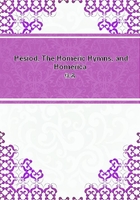But I have already wearied myself, and doubt not but I have tired your lordship's patience, with this long, rambling, and, I fear, trivial discourse. Upon the one-half of the merits, that is, pleasure, I cannot but conclude that Juvenal was the better satirist. They who will descend into his particular praises may find them at large in the dissertation of the learned Rigaltius to Thuanus. As for Persius, I have given the reasons why I think him inferior to both of them; yet I have one thing to add on that subject.
Barten Holyday, who translated both Juvenal and Persius, has made this distinction betwixt them, which is no less true than witty--that in Persius, the difficulty is to find a meaning; in Juvenal, to choose a meaning; so crabbed is Persius, and so copious is Juvenal; so much the understanding is employed in one, and so much the judgment in the other; so difficult is it to find any sense in the former, and the best sense of the latter.
If, on the other side, any one suppose I have commended Horace below his merit, when I have allowed him but the second place, I desire him to consider if Juvenal (a man of excellent natural endowments, besides the advantages of diligence and study, and coming after him and building upon his foundations) might not probably, with all these helps, surpass him; and whether it be any dishonour to Horace to be thus surpassed, since no art or science is at once begun and perfected but that it must pass first through many hands and even through several ages. If Lucilius could add to Ennius and Horace to Lucilius, why, without any diminution to the fame of Horace, might not Juvenal give the last perfection to that work? Or rather, what disreputation is it to Horace that Juvenal excels in the tragical satire, as Horace does in the comical? I have read over attentively both Heinsius and Dacier in their commendations of Horace, but I can find no more in either of them for the preference of him to Juvenal than the instructive part (the part of wisdom, and not that of pleasure), which therefore is here allowed him, notwithstanding what Scaliger and Rigaltius have pleaded to the contrary for Juvenal.
And to show I am impartial I will here translate what Dacier has said on that subject:-
"I cannot give a more just idea of the two books of satires made by Horace than by comparing them to the statues of the Sileni, to which Alcibiades compares Socrates in the Symposium. They were figures which had nothing of agreeable, nothing of beauty on their outside; but when any one took the pains to open them and search into them, he there found the figures of all the deities. So in the shape that Horace presents himself to us in his satires we see nothing at the first view which deserves our attention; it seems that he is rather an amusement for children than for the serious consideration of men.
But when we take away his crust, and that which hides him from our sight, when we discover him to the bottom, then we find all the divinities in a full assembly--that is to say, all the virtues which ought to be the continual exercise of those who seriously endeavour to correct their vices."
It is easy to observe that Dacier, in this noble similitude, has confined the praise of his author wholly to the instructive part the commendation turns on this, and so does that which follows:-
"In these two books of satire it is the business of Horace to instruct us how to combat our vices, to regulate our passions, to follow nature, to give bounds to our desires, to distinguish betwixt truth and falsehood, and betwixt our conceptions of things and things themselves; to come back from our prejudicate opinions, to understand exactly the principles and motives of all our actions; and to avoid the ridicule into which all men necessarily fall who are intoxicated with those notions which they have received from their masters, and which they obstinately retain without examining whether or no they be founded on right reason.
"In a word, he labours to render us happy in relation to ourselves; agreeable and faithful to our friends; and discreet, serviceable, and well-bred in relation to those with whom we are obliged to live and to converse. To make his figures intelligible, to conduct his readers through the labyrinth of some perplexed sentence or obscure parenthesis, is no great matter; and, as Epictetus says, there is nothing of beauty in all this, or what is worthy of a prudent man.
The principal business, and which is of most importance to us, is to show the use, the reason, and the proof of his precepts.
"They who endeavour not to correct themselves according to so exact a model are just like the patients who have open before them a book of admirable receipts for their diseases, and please themselves with reading it without comprehending the nature of the remedies or how to apply them to their cure."
Let Horace go off with these encomiums, which he has so well deserved.
To conclude the contention betwixt our three poets I will use the words of Virgil in his fifth AEneid, where AEneas proposes the rewards of the foot-race to the three first who should reach the goal:-
"Tres praemia primi . . .
Accipient, flauaque caput nectentur oliva."
Let these three ancients be preferred to all the moderns as first arriving at the goal; let them all be crowned as victors with the wreath that properly belongs to satire. But after that, with this distinction amongst themselves:-
"Primus equum phaleris insignem victor habeto."
Let Juvenal ride first in triumph.
"Alter Amazoniam pharetram, plenamque sagittis Threiciis, lato quam circumplectitur auro Balteus, et tereti subnectit fibula gemma."
Let Horace, who is the second (and but just the second), carry off the quiver and the arrows as the badges of his satire, and the golden belt and the diamond button.
"Tertius Argolico hoc clypeo contentus abito."















